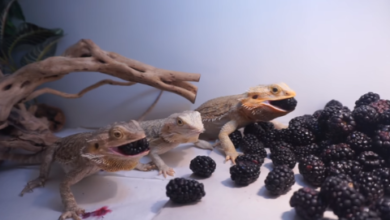Can Bearded Dragons Eat Raspberries? What You Need to Know
The Definitive Guide to Feeding Raspberries to Bearded Dragons: Juicy Benefits or Risky Business?

For bearded dragon owners looking to spice up their pet’s diet, fruits like raspberries can seem like a healthy, natural treat.
With their bright color and sweet flavor, raspberries may catch your bearded dragon’s interest. But can bearded dragons eat raspberries?
Can Bearded Dragons Eat Raspberries?

Raspberries contain essential vitamins and minerals that benefit a bearded dragon’s health. This includes vitamin C to boost the immune system, antioxidants to reduce cell damage, and natural sugars to provide energy.
However, too many raspberries can also lead to potential downsides like diarrhea, obesity, and allergic reactions in some beardies.
Overall, feeding raspberries in moderation seems to be fine for most bearded dragons. But it’s still smart to educate yourself on the pros and cons before trying.
This article will cover everything you need to know about giving your bearded dragon raspberries.
- Native to Australia, bearded dragons are omnivorous lizards that thrive on a varied diet.
- In captivity, they eat a combination of insects, vegetables, and some fruits. Popular fruits are apples, blueberries, bananas, and melons.
- As for raspberries, their high fiber and low calories make them a decent occasional treat. The vibrant color can also entice picky eaters.
What do the Experts Say?
According to Dr. Liana Neville, exotics veterinarian, “Raspberries are a fine source of nutrients for bearded dragons.
The antioxidants are quite beneficial. Just be mindful of portion size, as too much sugar can cause diarrhea.”
- Rich in antioxidants, vitamins, and fiber, raspberries offer vital nourishment. Specific nutrients are:
- Vitamin C – strengthens the immune system
- Anthocyanins – reduce cell damage
- Fiber – aids digestion
- At around 65 calories per cup, raspberries are low in fat and calories. This makes them less likely to cause obesity.
- Natural sugars also provide a healthy energy boost. Wild bearded dragons enjoy eating fallen, ripe fruits for this reason.
- However, too much natural and added sugar can still lead to weight gain if fed too often. Moderation is key.
It’s clear that raspberries can be a nutritious part of a bearded dragon’s balanced diet when fed properly and in moderation.
Next, we’ll cover the benefits and potential risks in more detail so you can make an informed decision.
We learned that raspberries can offer important vitamins, minerals, and fiber for bearded dragons as an occasional treat.
Now let’s dive deeper into the potential benefits and risks of feeding raspberries so you can make an informed decision.
Potential Benefits
- Excellent source of vitamin C – Raspberries contain over 50% of a bearded dragon’s DV of vitamin C per cup. This vital nutrient helps strengthen the immune system to fight disease.
- Packed with antioxidants called anthocyanins – These compounds help reduce oxidative damage to cells caused by things like UV radiation and pollution. This protects the skin and organs.
- High fiber aids digestion – Bearded dragons don’t produce certain enzymes to break down fiber. So, the fiber in raspberries can support a healthy gut and bowel movements.
According to Dr. Angela Stone, a reptile veterinarian, “Raspberries make a great occasional treat for bearded dragons. The vitamin C and antioxidants are particularly beneficial.”
Here is a simple recipe for a nutritious chopped fruit salad containing raspberries that your bearded dragon will love:
Bearded Dragon Fruit Salad
- 1/2 cup chopped raspberries
- 1/2 cup chopped strawberries
- 1/2 cup chopped blueberries
- 1/2 cup chopped melon or mango
- 1 tbsp chopped collard greens
Wash all fruit thoroughly. Chop into small pieces. Mix together in a bowl. Top with collard greens. Serve 1-2 teaspoons 2 times per week.
Potential Risks
- High natural sugar – While raspberries are relatively low in sugar for a fruit, too much can still cause diarrhea, gastrointestinal upset, or obesity.
- Possible choking hazard – Like most fruits, raspberries should be chopped well to prevent choking, especially for juvenile bearded dragons.
- Allergies – Some bearded dragons may be allergic to raspberries. Monitor for signs of an adverse reaction when first feeding.
Overall, the potential benefits seem to outweigh the risks as long as raspberries are fed properly in moderation. Most bearded dragons appear to enjoy them with no issues.
Pay attention to your individual lizard’s response.
Now that we’ve covered the potential benefits and risks of feeding raspberries to bearded dragons, let’s look at some best practices for serving this fruit safely.
Read More: Can Bearded Dragons Eat Tomatoes?
How to Feed Raspberries
- Wash thoroughly – Always wash raspberries under running water even if organic. This removes any pesticides or bacteria.
- Remove stems and leaves – The stems and leaves of raspberries contain a small amount of toxins. It’s best to remove them.
- Chop or mash – Whole raspberries pose a choking risk. Chop or mash them into bite-sized pieces your bearded dragon can safely eat.
- Hand feed for control – Feed pieces one at a time by hand. This prevents overeating and allows you to monitor portions.
- Offer with greens – Combine a few small raspberry pieces with staple greens like collard or mustard. This creates a balanced meal.
Signs Your Bearded Dragon Likes Raspberries
- Enthusiastic eating – Eats pieces quickly and licks lips looking for more.
- Normal energy and poops – No changes to energy level or bowel movements afterward.
- No adverse reactions – Monitor for signs of diarrhea, lethargy, or redness around the mouth.
As long as your bearded dragon seems to enjoy raspberries and experiences no issues, there is no need to avoid this treat. But listen to your individual pet’s response.
Raspberries can be a nutritious and safe occasional treat for most bearded dragons when fed properly. We’ve covered the key benefits, risks, serving tips, and signs your bearded dragon likes raspberries.

